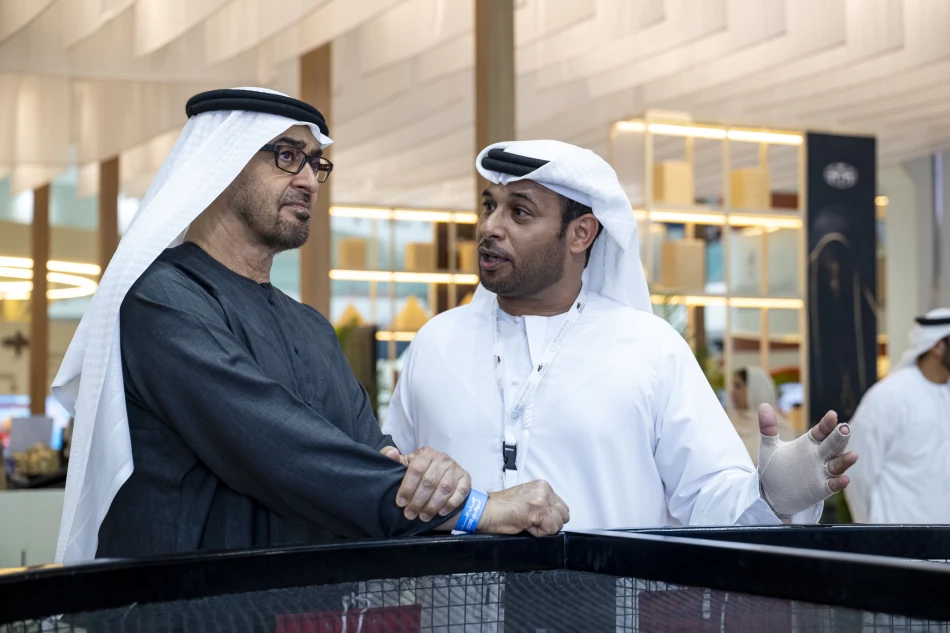
Unveil the Official Wearable for Abu Dhabi Masters Games 2026 at the Abu Dhabi International Hunting and Equestrian Exhibition
Abu Dhabi Unveils Official Bracelet for 2026 Masters Games as Region Positions for Sports Tourism Dominance
Abu Dhabi has officially launched the ceremonial bracelet for the 2026 Masters Games, marking a significant milestone in the emirate's ambitious bid to become the Middle East's premier sports destination. The launch, endorsed by UAE President Sheikh Mohammed bin Zayed Al Nahyan during the Abu Dhabi International Hunting and Equestrian Exhibition, signals the region's growing confidence in challenging established sporting hubs like Singapore and Australia for international multi-sport events.
Presidential Endorsement Underscores Strategic Importance
The symbolic gesture of Sheikh Mohammed bin Zayed wearing the official bracelet during his exhibition visit carries weight beyond ceremonial protocol. This high-level endorsement reflects the UAE's systematic approach to sports diplomacy, similar to Qatar's World Cup strategy and Saudi Arabia's recent sporting investments through the Public Investment Fund.
Aref Al Awani, Secretary-General of Abu Dhabi Sports Council, emphasized that the bracelet launch represents a crucial step in preparations for what will be the first Masters Games held in the Middle East. This geographic milestone positions Abu Dhabi alongside previous hosts like Auckland, Sydney, and Turin in the prestigious international circuit.
Market Implications for Regional Sports Economy
The February 6-15, 2026 event expects to attract over 25,000 participants across 30+ sports disciplines, creating substantial economic ripple effects. For context, the 2017 Auckland Masters Games generated approximately $32 million in economic impact, suggesting Abu Dhabi's larger-scale event could deliver significantly higher returns.
Tourism and Infrastructure Investment
The Masters Games strategy aligns with Abu Dhabi's broader economic diversification efforts, complementing major projects like the Louvre Abu Dhabi and upcoming Guggenheim. Unlike one-off mega-events, Masters Games target the growing active aging demographic—participants typically aged 35 and above with higher disposable incomes and extended stay patterns.
Competitive Positioning Against Regional Rivals
Abu Dhabi's Masters Games bid represents a calculated move in the intensifying Gulf sports competition. While Saudi Arabia focuses on professional leagues and mega-events through Vision 2030, and Qatar leverages its World Cup legacy, the UAE targets the participatory sports tourism segment—a less crowded but potentially more sustainable market.
Cultural Integration Strategy
The inclusion of traditional Emirati sports alongside modern disciplines reflects a sophisticated branding approach. This cultural authenticity factor differentiates Abu Dhabi from purely commercial sporting destinations, potentially creating longer-term visitor loyalty and repeat engagement.
Investment Outlook and Long-term Impact
For investors and hospitality stakeholders, the Masters Games represents a proof-of-concept for Abu Dhabi's sports tourism infrastructure. Success in 2026 could position the emirate for hosting larger International Olympic Committee-sanctioned events, including potential Olympic Games bids.
The 10-day competition format also offers advantages over shorter sporting events, requiring extended accommodation bookings and creating opportunities for ancillary tourism activities. This model particularly benefits Abu Dhabi's luxury hospitality sector and cultural attractions.
Broader Regional Implications
Abu Dhabi's Masters Games ambition reflects the Gulf's systematic approach to soft power projection through sports. Unlike previous regional sporting investments focused primarily on spectator events, the Masters Games emphasizes participation and community engagement—potentially creating more authentic international relationships and sustained tourism flows.
The success of this initiative will likely influence similar strategies across the GCC, as neighboring states observe whether participatory sports tourism can deliver comparable returns to high-profile professional sporting events.
Most Viewed News

 Sara Khaled
Sara Khaled






